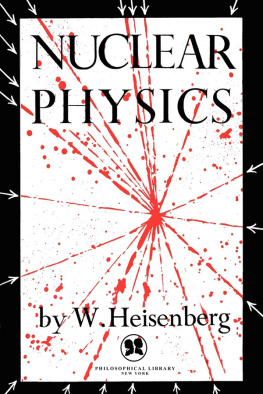Philip Ball is a freelance writer who lives in London. He worked for over twenty years as an editor for Nature, writes regularly in the scientific and popular media, and has written many books on the interactions of the sciences, the arts, and the wider culture.
The University of Chicago Press, Chicago 60637
The University of Chicago Press, Ltd., London
2014 by Philip Ball
All rights reserved. Published 2014.
Printed in the United States of America
23 22 21 20 19 18 17 16 15 14 1 2 3 4 5
ISBN-13: 978-0-226-20457-4 (cloth)
ISBN-13: 978-0-226-20460-4 (e-book)
DOI: 10.7208/chicago/9780226204604.001.0001
Originally published by Bodley Head, 2013.
LIBRARY OF CONGRESS CATALOGING-IN-PUBLICATION DATA
Ball, Philip, 1962
Serving the Reich : the struggle for the soul of physics under Hitler / Philip Ball.
pages ; cm
Includes bibliographical references and index.
ISBN 978-0-226-20457-4 (cloth : alk. paper) ISBN 978-0-226-20460-4 (e-book)
1. National socialism and science. 2. Nuclear physicsGermanyHistory20th century. 3. World War, 19391945ScienceGermany. 4. ScienceMoral and ethical aspectsGermany. 5. Kaiser-Wilhelm-Institut fr Physik. 6. GermanyHistory19331945. 7. Planck, Max, 18581947. 8. Debye, Peter J. W. (Peter Josef William), 18841966. 9. Heisenberg, Werner, 19011976. I. Title.
QC773.3.G3B35 2014
530.0943'09043dc23
2014010718
 This paper meets the requirements of ANSI/NISO Z39.48-1992 (Permanence of Paper).
This paper meets the requirements of ANSI/NISO Z39.48-1992 (Permanence of Paper).
Serving the Reich
THE STRUGGLE FOR THE SOUL OF PHYSICS UNDER HITLER
Philip Ball
THE UNIVERSITY OF CHICAGO PRESS
CHICAGO
Contents
Preface
There is a view becoming increasingly prevalent today that science is no more and no less than a candid exploration of the universe: an effort to find truths free from the ideological dogmas and ambiguities that beset the humanities, using a methodology that is fixed, transparent and egalitarian. Scientists are only human, to be sure, but science (in this view) is above our petty preoccupationsit occupies a nobler plane, and what it reveals is pristine and abstract. This is a time when one can claim without fear of challenge that science is disembodied, pure knowledge. There are scientists and science advocates who consider that historians, philosophers and sociologists, by contrast, can offer little more than compromised, contingent half-truths; that theologians spin webs out of vapour, politicians are venal and penny-pinching vote chasers, and literary theorists are brazen clowns and charlatans. Even the historians, philosophers and sociologists who study science itself are often regarded with suspicion if not outright hostility by practising scientists, not just because they complicate sciences tidy self-image but because some scientists cannot imagine why science should need this kind of scrutiny. Why cant scientists be left alone to get on with the business of excavating truth?
This Panglossian description doubtless betrays my scepticism. These trends wax and wane. It is a commonplace to say that scientists once served God, or at other times industry, or national glory. Only a few decades ago science seemed to be happily swimming in the cultural mix, enchanting us with dazzling images of chaos and complexity and looking for dialogue with artists and philosophers. But assaults from religious and political fundamentalists, posturing cultural relativists and medical quacks have understandably left many scientists feeling embattled and desperate to recapture a modicum of intellectual authority. And it remains the case that science has a means of investigation that works and can provide reliable knowledge, and of this its practitioners are fittingly proud.
Yet an insistence on the purity of science is dangerous, and I hope that this book will suggest some reasons for saying so. In studying the responses of scientists working in Germany to the rise of the Third Reich, I could not but be dismayed at how the attitudes of many of themthat science is apolitical, above politics, a higher calling with a stronger claim on ones duty and loyalties than any affairs of human intercoursesound close to statements I have heard and read by scientists today.
Peter Debye, who is one of the key figures in this story, was also considered a scientists scientist. An examination of Debyes life shows how problematic this persona may become whenas is often the caselife calls for something else, something that cannot be answered with a quip or an equation, or worst of all, with the defence that science should pay no heed to such mundane matters.
Debye, like many of his colleagues, doubtless did what he was able in extraordinarily difficult times. Whether or not one feels inclined to criticize his choices, the real problem for scientists in Germany in the 1930s was not a matter of personal shortcomings but the fact the institution of science itself had become an edifice lacking any clear social and moral orientation. It had created its own alibi for acting in the world. We must treasure and defend science, but not at the cost of making it different from other human endeavours, with unique obligations and ethical boundariesor a unique absence of them.
Debyes story was first brought to my attention by science historian Peter Morris, and he has my deep gratitude for that. My attempts to navigate through the turbulent currents of this particular time and place have been made possible, and hopefully saved from the worst disasters, by the extremely generous help of many experts and other wise voices, and here I am grateful to Heather Douglas, Eric Kurlander, Dieter Hoffmann, Roald Hoffmann, Horst Kant, Gijs van Ginkel, Mark Walker, Stefan Wolff and Ben Widom. Norwig Debye-Saxinger was very gracious in discussing with me some sensitive aspects of his grandfathers life and work. The Rockefeller Archive Center in Tarrytown, New York, made my visit very comfortable and productive.
My agent Clare Alexander, and my editors Jrg Hensgen, Will Sulkin and his successor Stuart Williams at Bodley Head have been as supportive and reliable as I have come, with much gratitude, to anticipate. I am particularly grateful on this occasion for Jrgs perspectives on German culture and history. I was very glad to have benefitted once again from the sensitive and reliable copy-editing of David Milner. As ever, my wife Julia and my family are my inspiration.
Philip Ball
London, March 2013
Introduction:
Nobel Prize-winner with dirty hands
Very few great twentieth-century physicists are household names, but Peter Debye must enjoy, if that is the right word, one of the lowest returns of fame within this pantheon. Partly this reflects the nature of his work and discoveries. Albert Einstein, Werner Heisenberg and Stephen Hawking have become regarded, in many respects quite rightly, as pronouncing on deep mysteries about the nature of the physical world. Debye, in contrast, made his largest contributions in an abidingly unfashionable field of science: chemical physics. He decoded the physical character of molecules, and especially how they interact with light and other forms of radiation. His range was remarkable: he helped to understand, for example, how X-rays and electron beams can reveal the shapes and movements of molecules, he developed a theory of salt solutions, he devised a method for measuring the size of polymer molecules. For some of this work he won a Nobel Prize in 1936. He has a scientific unit named after him, and several important equations bear his name. None of this sounds terribly earth-shaking, and in many ways it is not. But Debye is rightly revered by scientists today as someone with phenomenal intuitive insight and mathematical skill, who could see to the heart of a problem and develop its description in ways that were not just profound but useful. It is very rare to find such theoretical and pragmatic sensibilities combined in a scientist.
Next page















 This paper meets the requirements of ANSI/NISO Z39.48-1992 (Permanence of Paper).
This paper meets the requirements of ANSI/NISO Z39.48-1992 (Permanence of Paper).